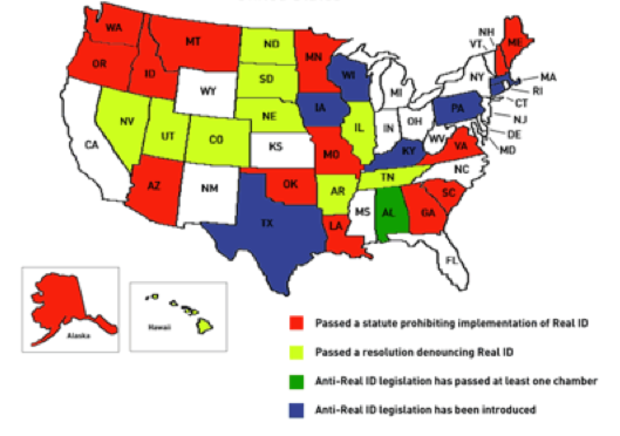Homeland Security bows to Real ID outcry
Americans will be able to use their driver's licenses after May 11 to travel by air after all.
The U.S. Department of Homeland Security today postponed the effective date of the Real ID Act until January 15, 2013, a move that avoided causing tremendous disruptions to air travel.
The reason that Homeland Security granted the delay is that, apart from some Republican stalwarts in Congress, this law creating a digital nationalized ID is hardly popular, with critics calling it a national ID card. A chart (PDF) updated last month by the National Conference of State Legislatures lists 16 states with laws forbidding them to comply with Real ID and eight states including Colorado, Hawaii, and Illinois that have enacted resolutions effectively boycotting it.
Once the regulations take full effect, the impact on Americans would be dramatic: Residents of those 24 states including Arizona, Georgia, Oregon, and Washington would not be able to use their drivers' licenses to fly or enter a federal building such as a courthouse, even for jury duty. U.S. passports or military IDs would remain valid for identification.
Real ID supporters among the House Republican chairmen reacted angrily to the news of the delay -- the third to date. (See CNET coverage of the previous deadline extension and a related FAQ.)
"It is disappointing to me that the Obama administration has chosen to put Americans at risk by having another delay in implementing Real ID," Rep. F. James Sensenbrenner (R-Wisc.) said in a statement. He was joined by three other senior Republicans: House Judiciary Chairman Lamar Smith (R-Tex.), Oversight and Government Reform Chairman Darrell Issa (R-Calif.), and Homeland Security Chairman Peter King (R-N.Y.). The Federation for American Immigration Reform also denounced the deadline extension.
The Republicans claim that last week's arrest in Texas of Khalid Aldawsari on charges of attempted use of a weapon of mass destruction "underscores the importance" of implementing Real ID immediately. A criminal complaint (PDF) against Aldawsari alleges that he created a "synopsis of important steps" that included obtaining a forged U.S. birth certificate and obtaining a driver's license. Those documents could be used to rent cars and place explosives. But there's no evidence he began the process of obtaining fraudulent documents.
Because Real ID links state DMV databases, establishes a standard bar code that can be digitally scanned, and mandates that original documents such as birth certificates be verified, backers claim the benefits extend beyond antiterror and ID fraud cases. (Extending it to firearm and prescription drug sales has not been ruled out.)
Homeland Security's announcement today (PDF) carefully neglected to mention the state-by-state revolt against these federal mandates, with state governments citing privacy, federalism, and funding for their refusal to cooperate. One estimate puts compliance costs as high as $11 billion. The 9-page announcement says:
The inability of states to fully comply with the requirements of Real ID by May 11, 2011 is the result of a number of factors, including diminished state budgets caused by the economic downturn and the uncertainty throughout much of the 111th Congress about congressional action... Implementation of Real ID involves a significant financial investment, and, despite the receipt of substantial federal grant funds, a number of states are struggling to come up with the resources necessary to meet the full compliance deadline in these times of budget austerity.
The National Governors Association responded with a statement praising the 2013 extension: "Governors have long said that Real ID, in its current form, is unworkable. That has not changed. Extending the compliance deadline allows states and the federal government more time to find solutions that work. Arbitrary deadlines that only keep people from boarding an airplane do not make the impossible possible."
Yesterday, an Iowa House committee approved anti-Real ID legislation by a 22-1 vote, and the Florida legislature has recently held a hearing on the topic.
Without the extension, air travelers from non-Real ID states would at least be subjected to what Homeland Security delicately calls "delays" and "enhanced security screening," or perhaps even be denied boarding. In addition, driver's licenses from non-Real ID states could no longer be used to access "federal facilities," including military academies, the Pentagon, Treasury Department, the U.S. Capitol, Veterans Affairs hospitals, and some federal courthouses.
The Real ID Act was signed on May 11, 2005 by President Bush after overwhelmingly bipartisan votes in Congress. It was attached to a broader "war on terror" spending and tsunami relief bill that was approved unanimously by the Senate and by a vote of 368 to 58 in the House of Representatives. (Real ID cleared the House by a 261-161 vote as a standalone bill without hearings or debate.)
During the Bush administration, Homeland Security was an unabashed champion of Real ID. But under the Obama administration, the department has been far less effusive in its support of the law, and Napolitano has been quoted as talking about repealing Real ID in hopes of replacing it with something that "accomplishes some of the same goals." As Arizona governor, Napolitano signed a law forbidding the state from complying with Real ID.
